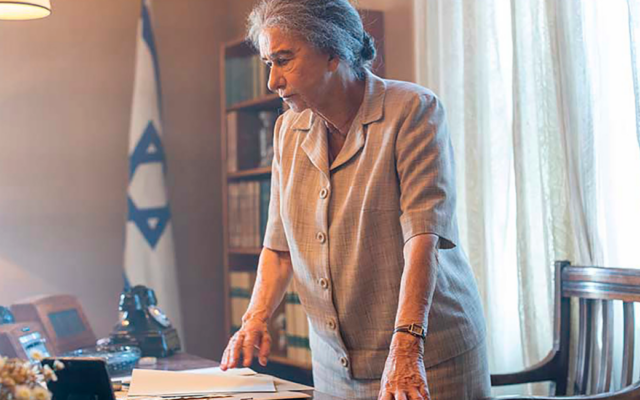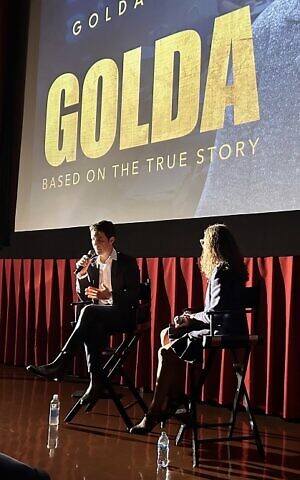‘Golda’ Demolishes the Myth of Golda Meir
The new film by Guy Nattiv aims to show the mental and physical challenges that the Israeli Prime Minister encountered during the 1973 Yom Kippur War.

The Golda Meir we encounter in Guy Nattiv’s new film about the Israeli Prime Minister is not the Golda Meir of legend. Unlike the Golda Meir whose abundance of grandmotherly charm warmed the hearts of American supporters of Israel a half century ago, this Golda Meir is a woman under siege.
Literally, she is besieged by the armies of Syria and Egypt, in the days leading up to the 1973 Yom Kippur War, The two nations are fighting to avenge their crushing defeat by Israel during the the Six Day War in 1967. But she is also besieged by her own ill health and her secret fight against lymphoma, a blood cancer that saps her energy and eats away at her indomitable spirit. Although “Golda,” the movie, is set in an Israel at war, much of the battle that is portrayed takes place inside Golda, the solitary soul.
During the three weeks of the October 1973 war, which is the setting for the production, the Israeli-born director deconstructs much of the myth that Americans have come to associate with Meir. As he told the AJT on a visit to Atlanta last month to promote the film at a preview sponsored by the Atlanta Jewish Film Festival, the difficult battles of the war are just part of a larger drama.
“There’s a chance here to focus on the inner Golda,” Nattiv said, “which is what went inside her head in these critical moments during the Yom Kippur war. It was the end of an era in Israel that had started with the hubris and the swagger from the 1967 war. In the film, the hero of that time, Moshe Dayan, the defense minister, is on the verge of collapse during this new war, begging to activate Israel’s nuclear weapons.”

The star of the film, Helen Mirren, is transformed by elaborate facial make-up and abundant body padding to approximate Meir’s appearance at the time. But the heavy facial prosthetics inhibit Mirren’s ability to fully communicate the Israeli prime minister dynamic personality. Nattiv says that so much of her characterization came in the way Mirren uses her eyes, the one part of her face that was relatively free of make-up and the way she moves. Mirren moves more slowly than anyone else in the film, as if she were carrying with her the full burden of the personal and political problems that weighed her down.
“Helen Mirren was like a turtle,” Nattiv says, “because she moves very slowly. She smokes very slow. She talks slowly. While everyone around her are chop, chop, chop, chop, chop fast talking Israelis.”
Meir bore the brunt of the failure of Israeli military intelligence to fully prepare for the attack by the Egyptians and the Syrians. That was despite a warning by a highly placed Egyptian spy for Israel, Ashraf Marwan. A new book just published in Israel, “When It Will Be Permitted To Talk,” describes how Marwan, the son-in-law of former Egyptian President Gamel Abdel Nasser, warned of the impending attack the night before it happened in 1973.
Another warning had come even earlier, in September, when King Hussein of Jordan met in a secret meeting in Israel with Meir and Dayan to alert the Israelis that Egyptians and Syrians were preparing to attack. He had learned about the plans on a visit to Cairo, where he was invited to be a part of the war, but he declined, because of the losses he had suffered during the 1967 conflict. He hoped that by warning the Israelis that they would press for better relations with the two Arab nations.
But his hopes and the warning were not taken seriously by the military. When the attack came on Yom Kippur, Israel was not fully prepared and, for a time, faced military defeat. The dramatic action in the film is backed by Golda Meir testimony before the Agranath Commission, which was set up to investigate Israel’s failure to fully prepare for the Egyptian and Syrian onslaught. She announced her resignation on April 10, 1974, after the Agranath Commission cleared her of any “direct responsibility” for the losses in the war. But in the popular Israeli imagination, the damage to her reputation was profound.
“The film is basically an opportunity to get in under her skin,” says the director, Nattiv, ”meaning we’re trying to understand what this woman went through and why no one cared about her after the war was ended. She was the scapegoat. She was the one to blame. But she took responsibility for her mistakes and resigned. Show me a politician that today would resign for her or his mistakes.”



comments